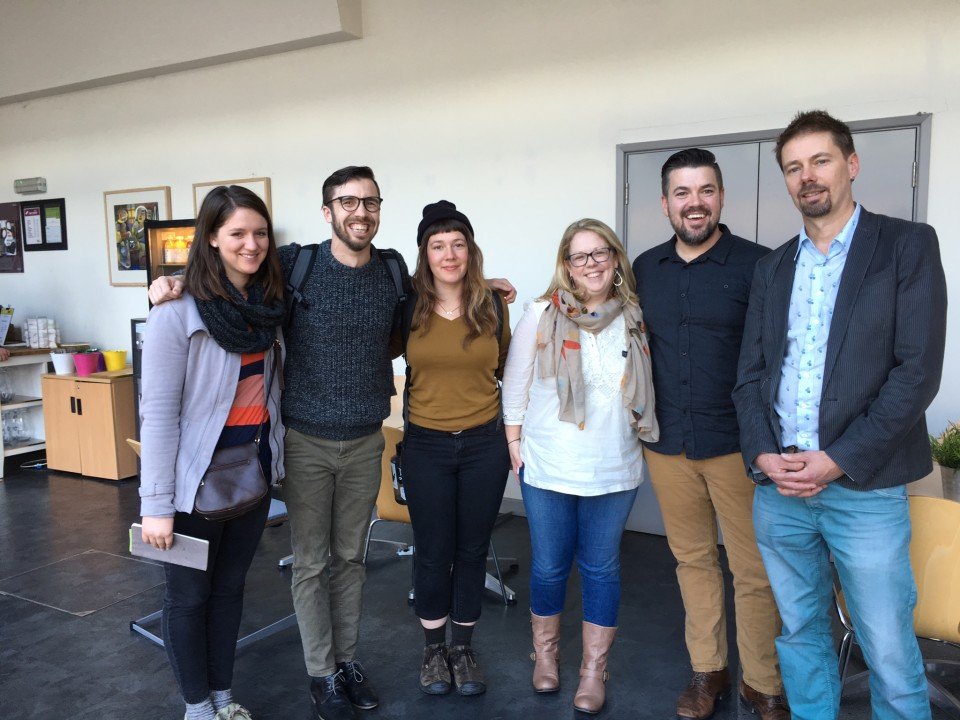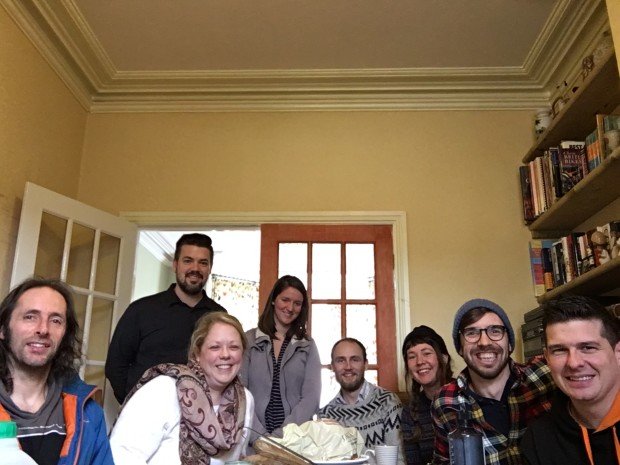UK Pilgrimage
Several of us traveled to England in February, 2016. While we are each reflecting in our own words what this experience meant to us and how it might be integrated back into our lives and ministry, we wanted to share some of the themes and most important learnings in one place. So here are the highlights:
1. We need two kinds of dissenters to create change:
Path finding dissenters - those who will find a new path and have the courage to follow it. These are the people who propose alternatives and inspire creative innovation.
Authority dissenters – those who spot path finding dissenters and encourage and protect them from the critique of those who like the status quo. – Jonny Baker (via Gerald Arbuckle)
“Real change and newness has a much better chance of taking root if it has this interplay between the two.” (Jonny Baker)
2. The new belongs elsewhere. Let practices happen along the edge of the church, then shine a light on it and begin to share stories and connect people together. – Jonny Baker
“If the dreamers are put in an environment with guardians of the status quo, the chances are they will put a lot of their energies into justifying themselves, and be under constant critique…which can sap a lot of energy. That energy would be better served in mission.” (Jonny Baker)
3. Crack the code of the church – hack the canons when necessary, find a way to make church language and rules fit what’s actually needed on the ground. – Jonny Baker
4. Allow yourself to be taken into other people’s worlds – In a multi-faith and multi-cultural world, we must enter fully into other cultures and find God seekers.“I am looking for God seekers so that we can journey together toward Christ who is the fullest expression of God….I need to present a Jesus who does not belong exclusively to Christianity.” – Andrew Jones
5. The Church is gift and should be freely given away to others as gift. The church is a way to draw people into community with Christ and to transform the world – it is a sign and a foretaste of God’s kingdom. – Michael Moynagh
“Just as you might share a stick of French bread with someone by breaking a piece off, so the church breaks off of piece of itself and offers it to others as a new expression of church. Similarly, just as you might share a bottle of wine by pouring it into glasses for other people to drink, so the church pours itself out in new expressions of church for others to enjoy. As the church does this, it passes itself on sacramentally. It gives part of its own body away in a way that other people are able to receive. Far from being diminished in this giving, just as Jesus is not diminished when he gives himself in the Eucharist, the church is enriched by this sharing of its body because others are drawn into its communal life.” (Michael Moynagh)
6. God’s mission comes first. God is out ahead of us doing new things and the Holy Spirit is at work in the church at the same time. “God’s missional grace is active both in the cosmos and in the church.” – Michael Moynagh
7. “Just get on with it” – spend less time talking about what you are going to do and more time doing it. Understanding and integration normally come after engaging in ministry. If you don’t, you will be 90 before you live out your calling. – Michael Moynagh
8. Contextual Ministry Matters – pioneers understand the importance of context. Knowing your context, understanding it, and even being able to critique means that you have spent enough time in your context AND that you are willing to be changed by your context. You will change if you enter fully into the context to which you are called. Theologically, this is Jesus entering fully into the Jewish world in which he found himself, becoming not just fully human, but fully part of the culture – eating foods, praying, sharing life in such a way that he became one of them.“The turn to context in global Christianity is massive. To make sense of the context will involve, for example, exploring notions of identity, reading, cultures, economics, religion, locale, myths, texts, symbols, power relations, gender, ethnicity.” (Jonny Baker)
9. God’s people gathered is more important than the rules. A deep commitment to sacramental life undergirds everything. – Mark Berry
10. Graciousness leads to unity. There is treasure everywhere, in the inherited church and in the new. Polite disagreement and a generous sense of catholicity means that we can disagree on the details and still see ourselves as part of God’s missional work. – Jonny Baker and Michael Moynagh and all
11. Pioneers stand outside the doors. Pioneers are most comfortable outside the walls of the church and will stand by the door and show people how to draw close to God. – Ben Norton
12. What is good news? If this no longer sounds like good news to this community, find out what is and learn to share the gospel with different words and actions. – Chris Hembury
13. Be bold – overcome your fear. Share yourself, your values, and your love of God even if you are afraid. – Chris Hembury
14. Feed your soul – Remember to play, do what you love, unleash your imagination, experience life even if it doesn’t connect to your ministry at all. Paint, ride a bike, make music, listen to your soul’s deep longing. – Sam Donaldson
15. Training works best if you develop modules or classes that meet the needs of the pioneer. Allow the pioneer to remain in their context, to fill in the gaps of their knowledge, and to learn how to seek wisdom from the inherited church. One size doesn’t fit all.

